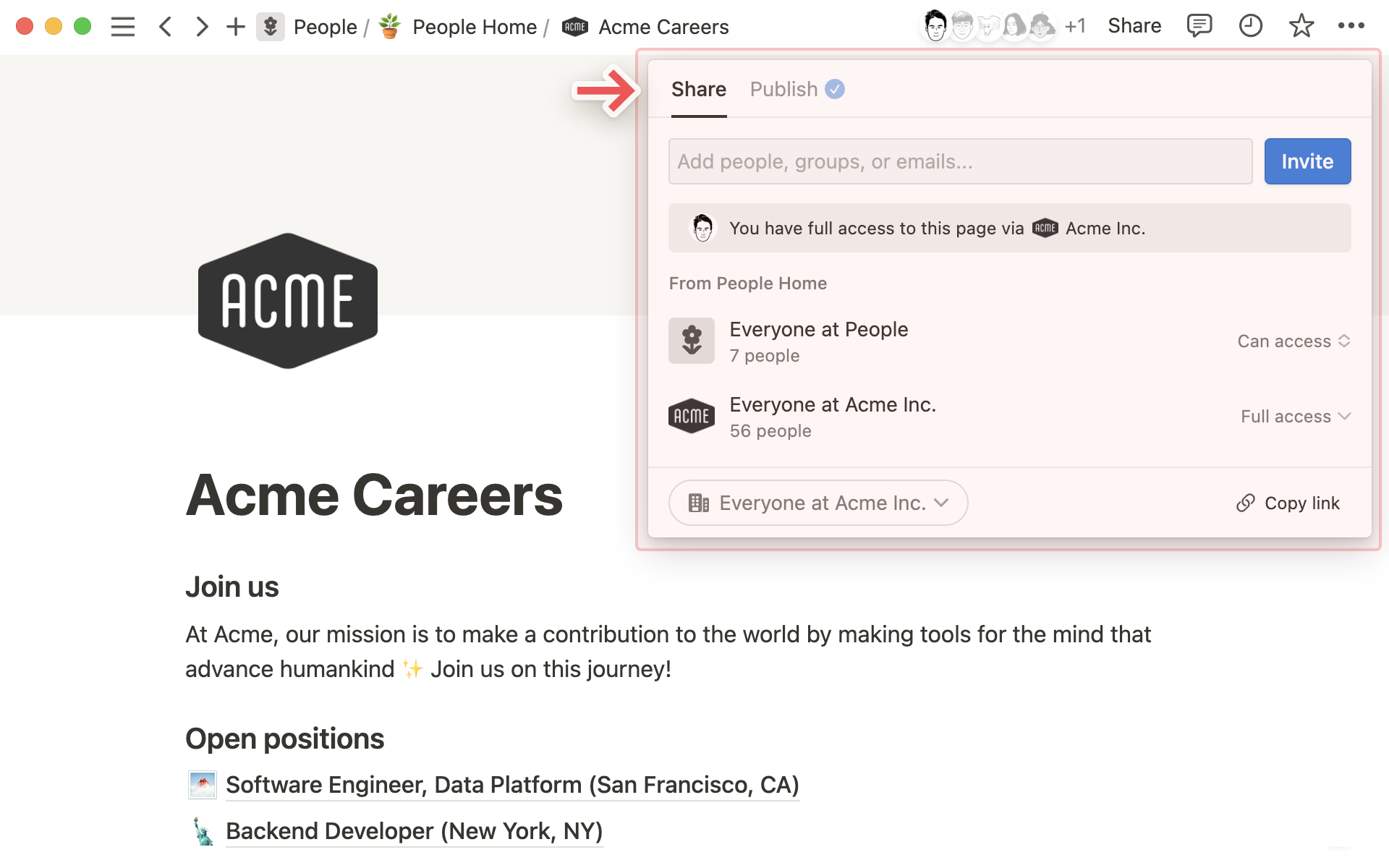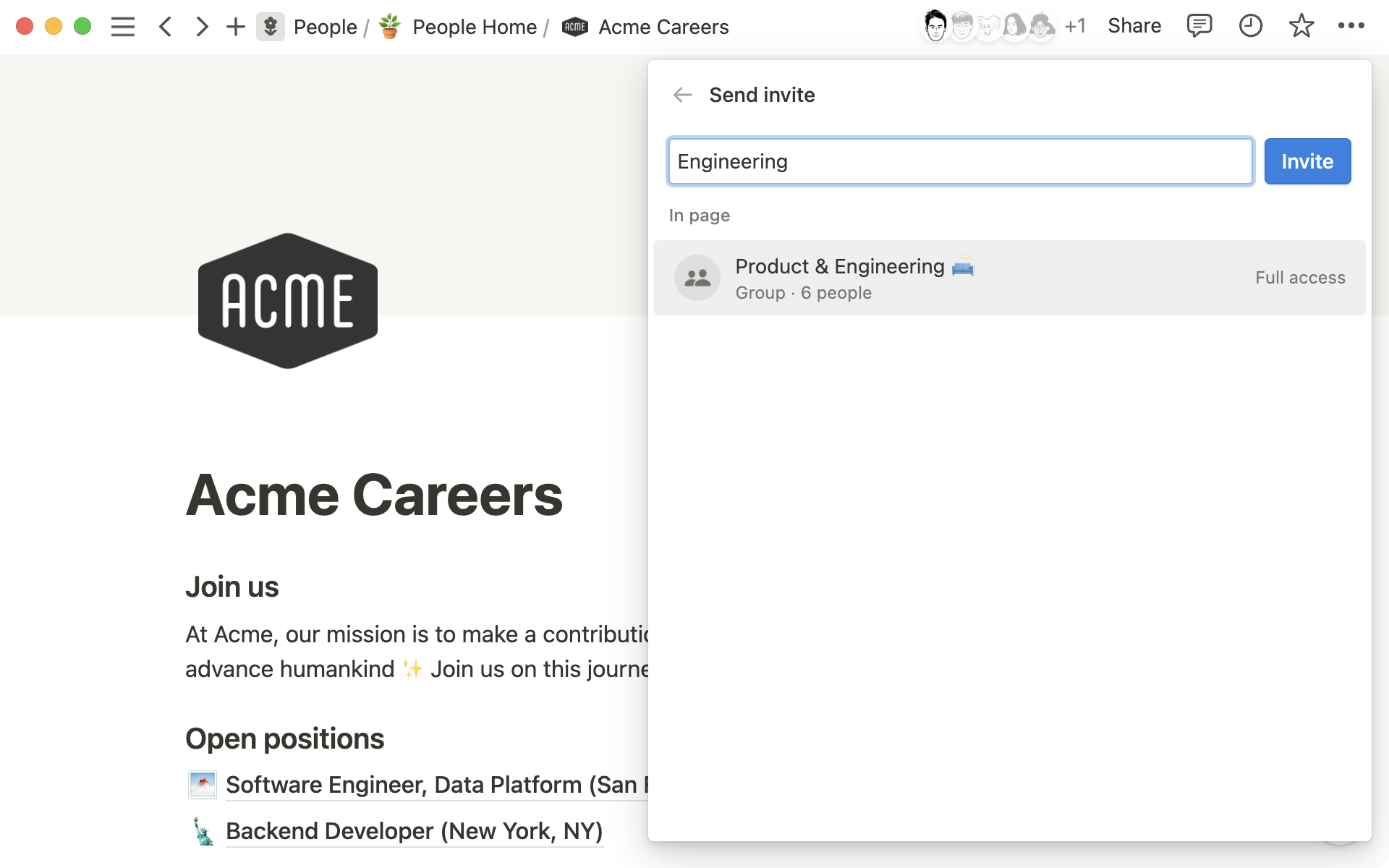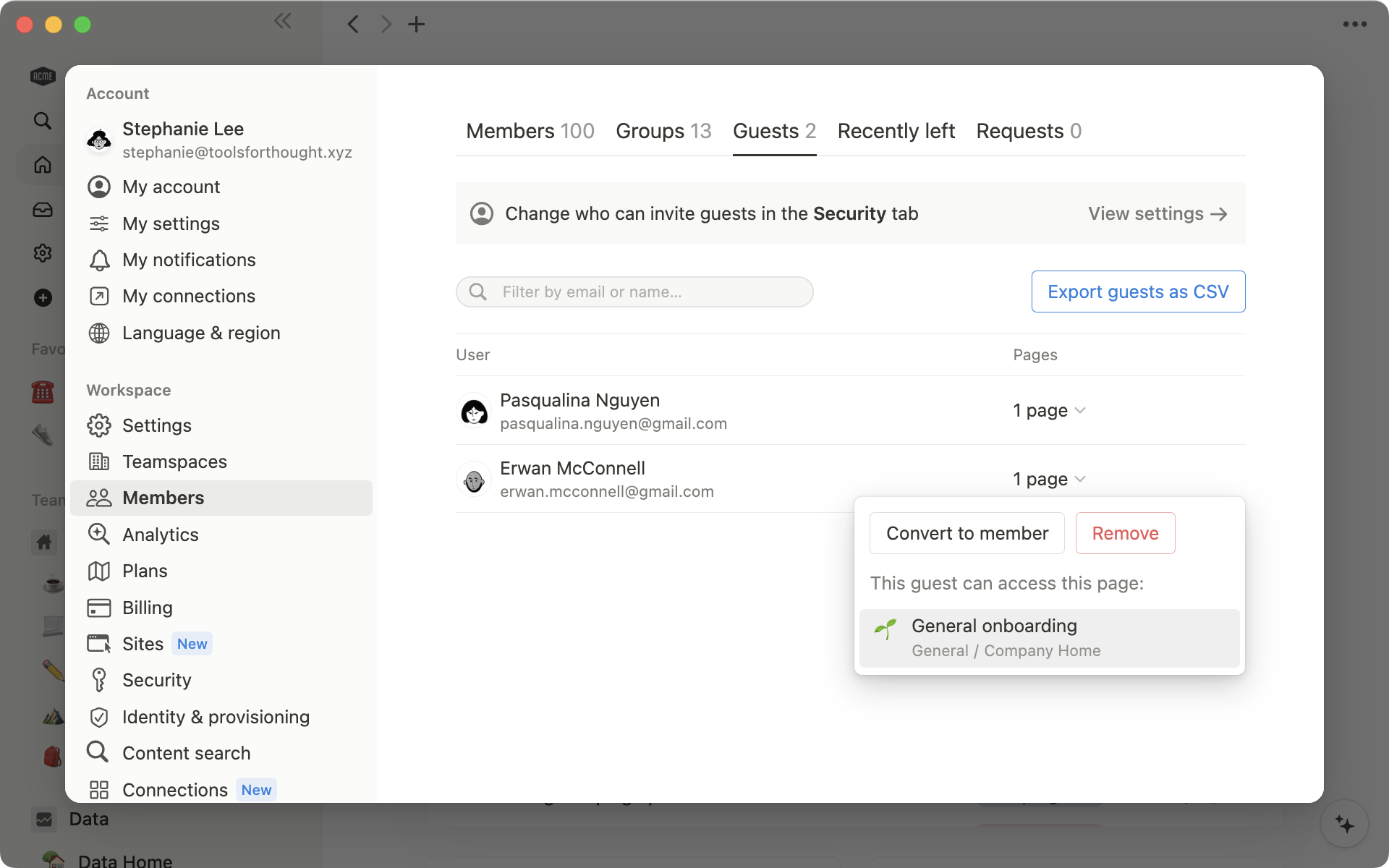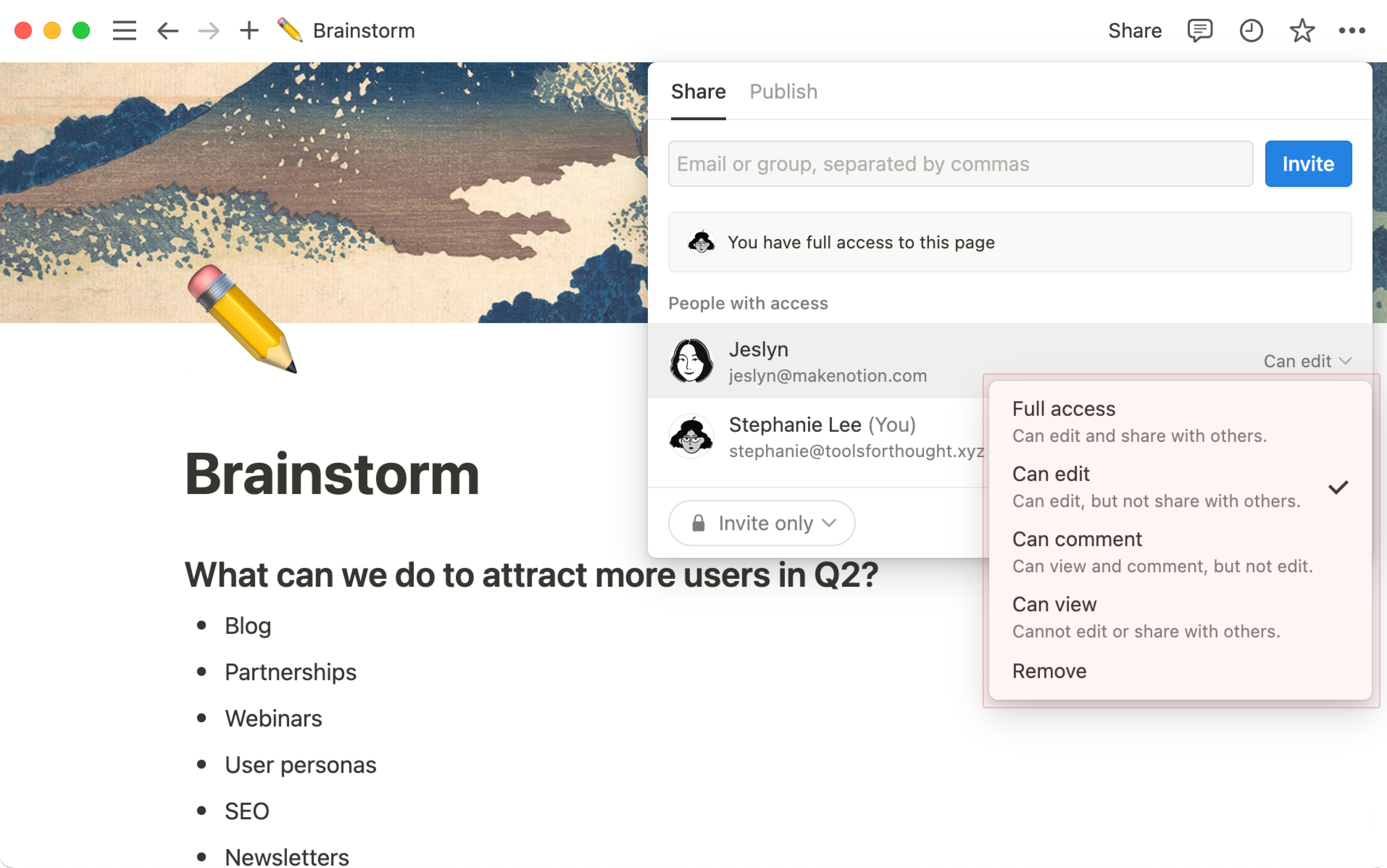Sharing & permissions

Notion is built for collaboration, so there are many ways to share your work with other people. Our permission levels ensure that your collaborators access your content exactly the way you want them to 📣
Jump to FAQsThere are several different ways you can share the pages and databases you build in Notion with folks inside and outside your workspace. Below is an overview of all the ways to share.
Select Share at the top of any page to open its share menu. Here, you can:
Invite someone to the page.
See and change who has access to the page, and what level of permissions they have.
Copy the page’s link to share it with others.

Select ••• at the top of any page, then open the Publish tab to share your page to the web as a Notion Site and manage it.
Your workspace might contain other members like teammates, friends, or anyone else you want to work with on pages. There are a few ways to share Notion pages with all members of your workspace:
Hover over the name of a default teamspace in your sidebar and create a new page inside of that teamspace by clicking the + that appears.
In your sidebar, drag a page into a default teamspace.
Select
•••at the top of a page and in the dropdown at the bottom of the menu, selectEveryone at {your workspace}.
Note: A default teamspace is a teamspace that everyone in a workspace must be a part of by default. To find out if a given teamspace is a default teamspace:
Select
•••next to the name of a teamspace in your sidebar.Select
Teamspace settings.In the
Memberstab, look forPermissions. If you seeDefault, this means that teamspace is a default teamspace.
Teamspaces are dedicated spaces for every team within your organization or company. Each teamspace has its own members and permission levels, which can be customized by its teamspace owners. Learn more about adding members and assigning permissions in teamspaces →
There are two ways to share Notion pages with any teamspace that you’re a member of:
Hover over the name of a teamspace in your sidebar and create a new page inside of that teamspace by clicking the
+that appears.In your sidebar, drag a page into a teamspace.
Sometimes you'll want to share a page with only select members of your workspace — like a meeting doc for 1:1s with your manager, or notes for a small project team. To share a page with specific people:
Select
Shareat the top of any page.Find and select the names of the members of your workspace that you want to share the page with.
Open the dropdown next to the names of the people you’re inviting, then select a permission level.
Select
Invite.
Pages shared with select workspace members will appear in the Shared section of your sidebar. Learn more about sidebar sections here →
If there are people you work with very often, you can create your own group of members and share Notion pages with that group so that you don’t have to invite each person one by one. Learn more about groups and group permissions here →
To share a page with a group:
Select
Shareat the top of any page.Find and select the names of the groups that you want to share the page with.
Open the dropdown next to the names of the groups you’re inviting, then select a permission level.
Select
Invite.

You can invite people from outside your workspace to access certain Notion pages as guests. This could be useful if you want to share a Notion page with a contractor you've hired, or a client you’re working with. Learn more about guests here →
To share a page with a guest:
Select
Shareat the top of the page.Enter the email address of any guest you want to invite.
Select a level of access for that guest from the dropdown and select
Invite.Select
Skip for nowto make sure you’re adding them as a guest and not a member.Your invited guest will receive an email with a link to the page.
If they don't already use Notion, they can sign up to access your page.
Note: If you’re on an Enterprise plan and the owner has prevented members from inviting guests to pages, then any people you invite to a page will automatically be added as members. Before you select Invite in the steps above, you can hover over your guest’s name or email for more information on how that person will be added to the page.

You can easily turn your Notion page into a beautiful website with Notion Sites. Learn more about how to share your page with the web here →
Seeing other people in a page you didn't mean to share? Want to make a page private? There are a few ways you can stop sharing your pages with others:
In your sidebar, drag a page into your
Privatesection so that only you can see it.Select
Shareat the top of the page, and switch off access for your workspace, individuals, groups, or the public. You can also selectRemovefrom the dropdown next to any of these.If you’re looking to remove guests from pages, go to
Settings & members→PeopleorMembers(depending on your plan) →Guests. Check the box next to the guests you want to remove from your workspace and selectRemove from workspace.
For every person, group, or teamspace you share a page with, you can assign a different permission level. This helps to keep private information private and gives you granular, precise control over your work.
Here are the different permission levels in Notion:
Full access: People with full access to a page can edit any of the content it contains and share the page with anyone they want.Can edit: Select this level of access for people who should be able to edit the content on the page, but not share the page with others.Can edit content: This permission level is only found on database pages. People with this level of access can create and edit pages within the database, and edit property values for those pages. However, they will not be able to change the structure of the database and its properties, views, sorts, or filters. Learn more about databases here →Can comment: Select this level of access for people who should only have the ability to comment on a page. They won’t be able to edit or share the content.Can view: People with this level of access can read the content on the page, but they won’t be able to comment, edit, or share.
There are also different actions that people can take in a workspace depending on their role in the workspace. To learn more, read this article →
Edit permission levels
Note: If someone has requested a change in their permissions on a page you own, you’ll be able to see, approve, and reject those requests from your Inbox.
To change someone’s permission level for a specific page:
Select
Shareat the top of the page.Open the dropdown next to the name of a person, group, or teamspace with whom the page has been shared.
Select a permission level.

Inherited permissions
When you create a subpage inside of a page, that subpage will take on the permissions of its parent page. If this is something you don’t want — for example, if you have shared a page with ten people but you want only two of those people to see its subpage — you need to go into the subpage and update the permission levels there.
Teamspace owners can set default permissions for content in their teamspace. This will apply to every new page created in the teamspace, and if you want to change them, you’ll have to make changes at the page level.
Permission overrides
Notion respects the broadest level of access given to a user. Let’s say you’ve given someone Can view permissions in a page, then later you decide you want your whole organization to have Full access to that page. Because that individual is a part of your organization, they’ll be given Full access as well, overriding the specific permission level you previously assigned them.
Additionally, moving a shared page to the Private section of your sidebar will override all of the existing permissions on that page. Anyone who previously had access to your page will immediately be unable to view it once you make it a Private page. Note that this override will only apply to the parent page — the permissions granted for any subpages will remain the same.
If a page is set to be accessible to Anyone with link, note that even those that don’t have the direct link may be able to access it if:
The page is mentioned in or linked from another page shared more broadly.
The page uses a two-way relation that links to another page shared more broadly.
The page is nested inside another page that has been shared more broadly.
You can tell who else has access to a page because their profile photos can be seen in the bar at the very top of the page.
An avatar appears faded out if that person is not currently looking at the page.
An avatar appears unfaded if the person is currently on the page.
Hovering over an avatar will show you the person's name, email, and when they were last on the page.
Clicking on an active avatar will jump you to the part of the page where they're reading or typing.
When people are collaborating on the same page at the same time, you'll see their avatars move next to the blocks they are looking at or editing.
Click
•••at the top right of any page and look at the bottom of the menu that pops up. You'll see who last edited the page and when.
Request access to a page
If you open a page that you don’t have access to, you can select No access on the page to send a request. This will notify the page’s creators or editors, who can choose to accept or deny your access request.
Request edit access
If you have view or comment access to a page and want edit access:
Open the page and select
Share.In the
Sharetab, you’ll see what level of permissions you currently have. Open the dropdown next to this information.Select
Request Edit Access.
This request will go to the page creator, who can accept or ignore it. You’ll be notified once your request has been accepted — try refreshing the page if you’re not able to edit it.
If you’re a workspace owner on an Enterprise plan, you can control content sharing with additional security settings. Learn more about these features here →
To see these settings, go to Settings & members in your sidebar, then select Security & data.
FAQs
I tried adding a guest to my workspace but they were turned into a member automatically. How can I prevent that?
I tried adding a guest to my workspace but they were turned into a member automatically. How can I prevent that?
If your workspace is above the guest limit for your plan, new users that you share content with will be automatically added as a member (instead of as a guest) if they have the same organization email domain.
To allow for a new user with the same organization email domain to be added as a guest, you will need to remove existing guests to fall below your plan limit, upgrade to a plan with a higher limit, or work with our sales team (for eligible customers).
If your workspace is above the guest limit for your plan, you may have the Allowed Email Domains setting turned on. When enabled, this feature allows people with that email domain to join your workspace as a member automatically. You can disable this setting in the Settings tab of Settings & Members in the left sidebar.
I want to share a page with a client, but they don't use Notion.
I want to share a page with a client, but they don't use Notion.
You can enable Share to the web in the Share menu, and share the URL with them. As long as you keep the Search engine indexing setting disabled (always disabled by default), only people with that exact URL will be able to access the page. They'll be able to view the page, even if they don't have a Notion account. However, they won't be able to make any edits, leave comments, or sort/filter a database.
My Export button is missing, it doesn't appear in any menus.
My Export button is missing, it doesn't appear in any menus.
You may have the Disable Export setting enabled in the Settings tab of Settings & Members in your left sidebar. You'll need to be an admin in your workspace, and on desktop to change this.
Can I limit access to different parts of a database? Can you make it so that some people can see certain database views or properties, but not others?
Can I limit access to different parts of a database? Can you make it so that some people can see certain database views or properties, but not others?
Unfortunately, database permissions don't get quite that granular yet 😓 It’s a legit use case though, and definitely something we want to support in the future. Stay tuned!
